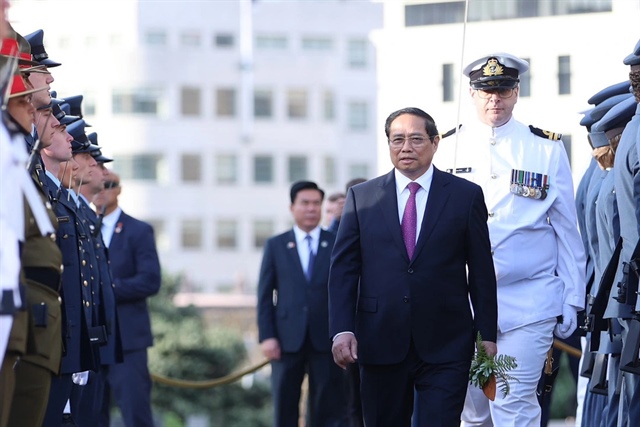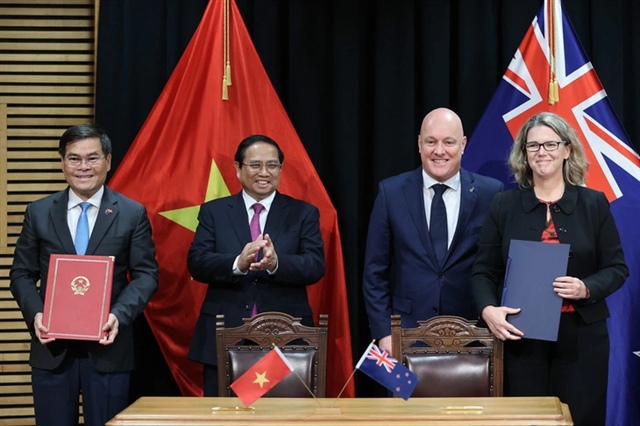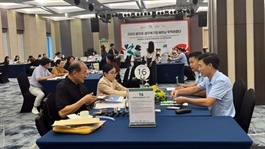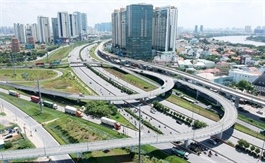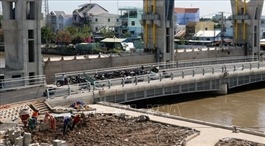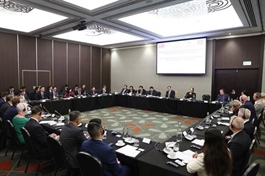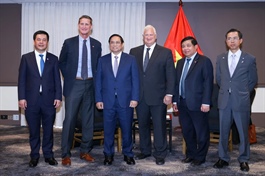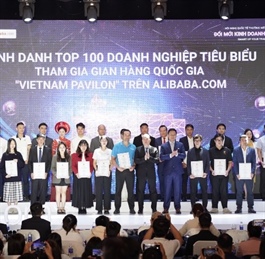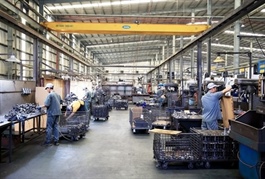Vietnam, New Zealand pledge to bolster strategic partnership, target $2bn trade this year
Vietnam, New Zealand pledge to bolster strategic partnership, target $2bn trade this year
Visiting Vietnamese Prime Minister Pham Minh Chinh and his New Zealand counterpart Christopher Luxon have agreed to strengthen multifaceted cooperation between the two countries as per their strategic partnership, aiming for US$2 billion in two-way trade in 2024.
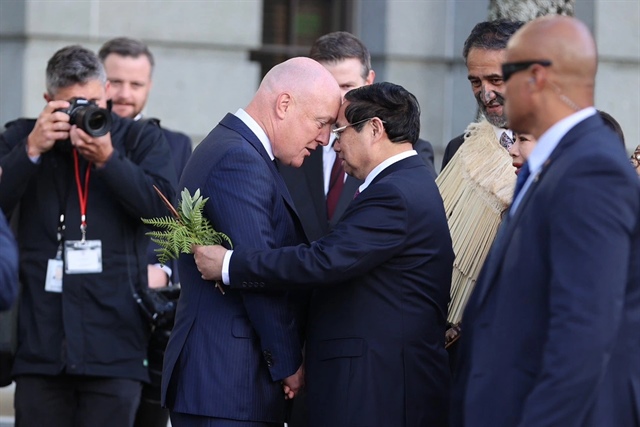
Vietnamese Prime Minister Pham Minh Chinh (R) and his New Zealand counterpart Christopher Luzon perform the ‘Hongi’ – a traditional Maori greeting, in which people press their noses and foreheads together instead of shaking hands – in Wellington on March 11, 2024. Photo: Nhat Bac / Tuoi Tre |
Their talks took place on Monday (local time) after an official welcome ceremony was conducted in front of the New Zealand Parliament Buildings for PM Chinh and his wife, who are on an official visit to New Zealand at the invitation of PM Luzon.
The ceremony started with the traditional rituals of Maori, the indigenous Polynesian people of mainland New Zealand, which included the ‘Hongi,’ in which people press their noses and foreheads together instead of shaking hands.
PM Chinh performed the Hongi with PM Luzon and received a 19-cannon salute amid the melody of the Vietnamese anthem.
At their talks, PM Chinh thanked the government and people of New Zealand for their warm and thoughtful welcome for his first visit to the country, a peaceful, civilized, beautiful, hospitable, green and safe nation, according to the Vietnam Government Portal.
|
|
| Vietnam’s Prime Minister Pham Minh Chinh and his spouse (front row, R, 3rd and 2nd) are seen being welcomed with a traditional Maori ritual of New Zealand at a reception ceremony in Wellington on March 11, 2024. Photo: Nhat Bac / Tuoi Tre |
Vietnam affirms its commitment to strengthen the strategic partnership with New Zealand, PM Chinh said.
He believed that this visit would elevate bilateral relations to new heights, aiming to celebrate 50 years of diplomatic ties in 2025 for mutual benefit and regional and global peace, stability, cooperation, and development.
Hailing PM Chinh's visit, PM Luxon expressed his pleasure in collaborating on political and trade commitments that benefit both nations and contribute to regional and global peace and stability.
Recognizing Vietnam as a nation with robust development momentum, Luxon confirmed that the Southeast Asian country is a crucial partner for New Zealand.
He congratulated the government and people of Vietnam on great economic achievements over the past years, commenting that Vietnam has become a ‘dragon’ with outstanding growth every year.
The host and guest are committed to promoting cooperation in all key pillars of their strategic partnership, including economy-trade-investment, security and defense, agriculture, culture and people-to-people exchanges, and local-to-local connections, the Vietnam Government Portal reported.
Considering the substantial 60-percent increase in two-way trade over the past five years, both parties aim to achieve a bilateral trade volume of $2 billion by the end of this year.
|
|
| Visiting Prime Minister Pham Minh Chinh is greeted by a New Zealand honor guard at a welcome ceremony in Wellington, New Zealand, March 11, 2024. Photo: Duy Linh / Tuoi Tre |
In 2022, the bilateral trade amounted to $1.4 billion, a jump of about 5.7 percent from a year earlier.
In 2023, their turnover reduced six percent year on year to reach $1.3 billion, according to official figures.
Currently, Vietnam is New Zealand’s 14th-largest trade partner, accounting for 1.7 percent of New Zealand’s total import-export turnover, while Wellington ranks 38th among Hanoi’s trading partners, according to the Vietnam News Agency.
The two leaders agreed that their countries need to make breakthroughs in science and technology, innovation, startup, green economy, digital economy, circular economy, emission reduction, agriculture, and environmentally-friendly technology transfers, as well as in new areas such as artificial intelligence (AI) and semiconductors.
Both sides are committed to setting up a cooperation plan to achieve the goal of net-zero emissions by 2050.
The two PMs laid emphasis on continued coordination and support for each other at regional and world forums, such as the United Nations, Asia-Europe Meeting, and ASEAN-led forums, among others.
|
|
| Vietnamese Prime Minister Pham Minh Chinh (R) and his New Zealand counterpart Christopher Luzon are seen at a press conference held after their talks in Wellington on March 11, 2024. Photo: Nhat Bac / Tuoi Tre |
Both leaders reiterated the significance of ensuring peace, stability, security, safety, and freedom of navigation and aviation in the East Vietnam Sea; avoiding the threat or use of force; settling disputes peacefully on the basis of international law, especially the 1982 United Nations Convention on the Law of the Sea (UNCLOS).
They were unanimous on strengthening maritime cooperation as well as exchanging and sharing information to turn the East Vietnam Sea into an area of peace, stability, friendship, cooperation, and sustainable development.
After the talks, the two PMs witnessed the signing of three bilateral agreements, including one on education cooperation for 2023-26 between the Vietnamese Ministry of Education and Training and the Education New Zealand.
The second deal is on economic and trade cooperation between the Vietnamese Ministry of Industry and Trade and the New Zealander Ministry of Foreign Affairs and Trade.
The last is a memorandum of understanding on cooperation between the Vietnamese Ministry of Finance and the Treasury of New Zealand.
|
|
| New Zealand Prime Minister Christopher Luzon (R, 2nd) and his Vietnamese counterpart Pham Minh Chinh (L, 2nd) witness the signing of a cooperation document between the two countries in Wellington, New Zealand, March 11, 2024. Photo: Nhat Bac / Tuoi Tre |
As part of his visit, PM Chinh on Sunday visited Auckland-based Plant and Food Research Center (PFR), a place with world-leading expertise, providing innovative solutions for hi-tech agriculture, and applying and commercializing research results.
The PFR briefed Chinh on many projects it has implemented with Vietnam’s ministers, scientists, businesses, and farmers to raise crop output, enhance quality and pest resistance for plants, and apply post-harvest and processing technologiee.
Building on the achieved milestones, the prime minister advised both sides to persist in promoting cooperation in high-potential areas, with a particular emphasis on making breakthroughs in agricultural economic collaboration.


